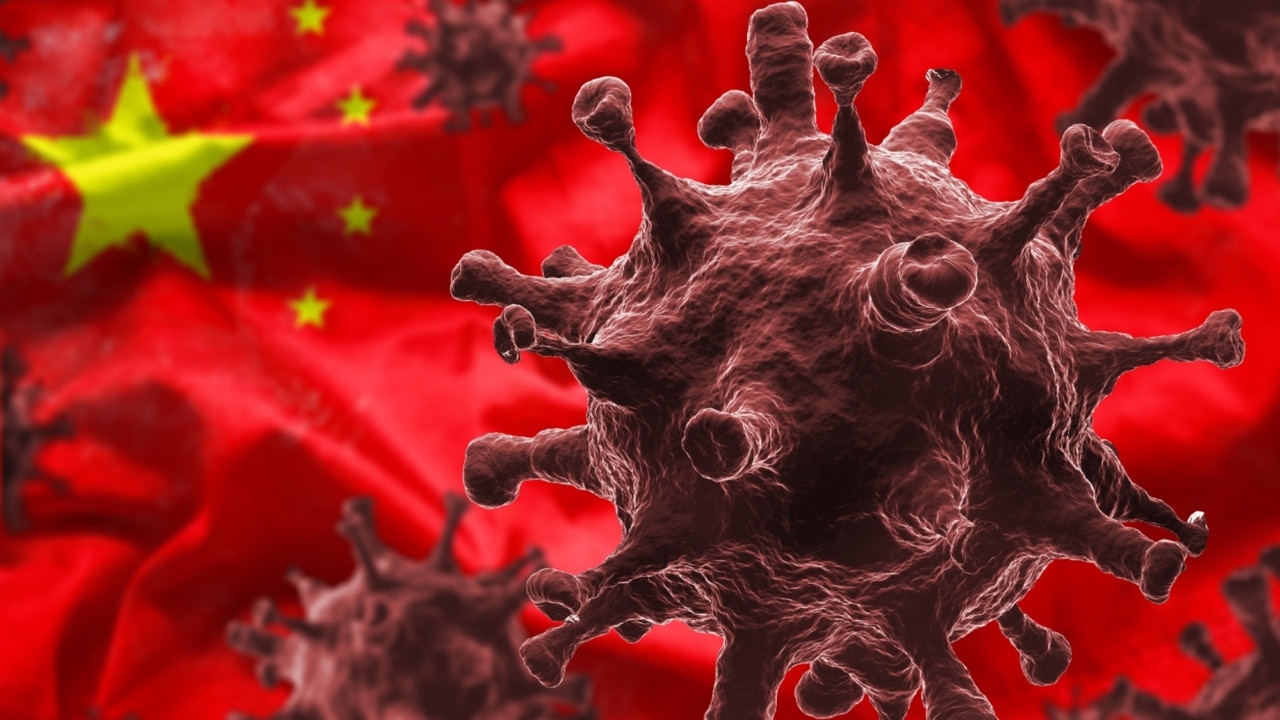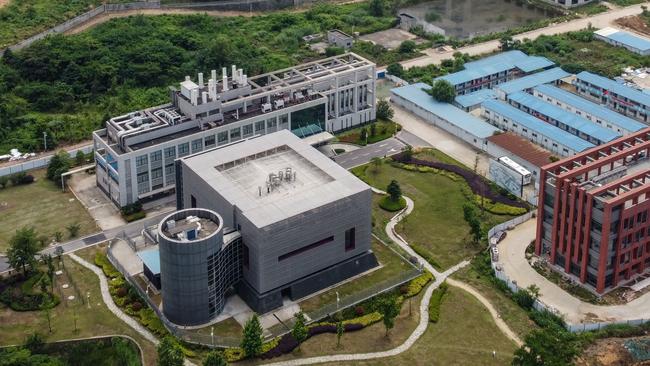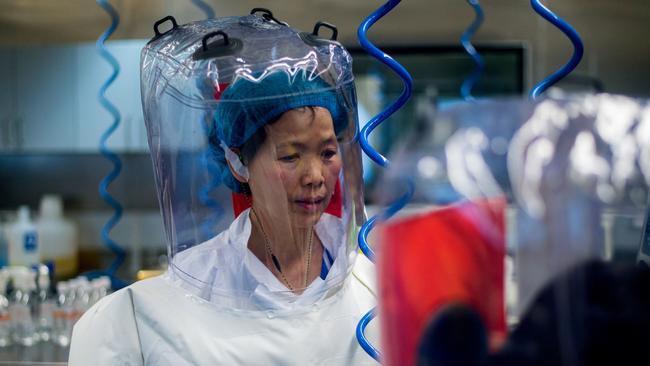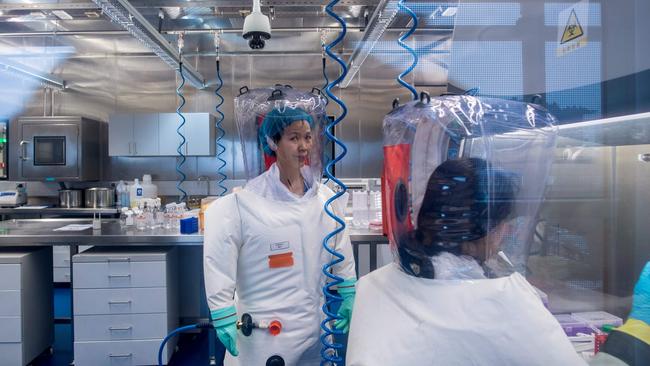Former spy chief: COVID-19 could have leaked from Wuhan lab
Australia’s former intelligence chief says it is possible COVID-19 could have leaked from a Wuhan laboratory and says a security review needs to be conducted of similar sites globally in the wake of the coronavirus pandemic.

NSW Coronavirus News
Don't miss out on the headlines from NSW Coronavirus News. Followed categories will be added to My News.
Australia’s former intelligence chief says it is possible COVID-19 could have leaked from a Wuhan laboratory and says a security review needs to be conducted of similar sites globally in the wake of the coronavirus pandemic.
Dennis Richardson, former head of foreign affairs, defence and ASIO, has also revealed there have been breaches of protocol at Australia’s biosecurity laboratories, making the point “accidents do occur”.
It comes amid extraordinary admissions by Chinese scientists that the wet market was not the source of the COVID-19 outbreak.


MORE
In reality, we’re united with The States on China
Sharri Markson exposes details of Chinese cover-up on Fox News
Criticism of China’s virus response does not equal support for Trump
Top Australian scientist’s Chinese friendship
Mr Richardson said while the origin of COVID-19 is not yet known, there should be a security review of high-level bio-containment facilities where deadly bat-derived coronaviruses are handled around the world.
“I think the security around such laboratories always has to be subject to review and I think everyone would hope that part of the review in respect of COVID-19 would be looking at security of facilities globally,” he said.
“That is something which we need to be alert to globally. We have such facilities here in Australia and I do know that in the past there have been one or two accidents, at least on one occasion in the past that has been in the media.

“So accidents do occur. Just how good China’s security is for its level 4 laboratories I simply don’t know. The point I’m making is that accidents can happen regardless of the level of security and accidents have happened at level 4 facilities globally and it wouldn’t surprise me if they’ve happened in China because they have happened elsewhere.”
Mr Richardson said an inadvertent leak of a naturally-occurring virus from a Wuhan laboratory was a possibility.
“Put it this way, it is a possibility. However, I don’t think it is wise to be pressing one possibility over another at this point,” he said.
“If you genuinely are interested in having a review, then it is absolutely essential that we have China’s co-operation. We’re not going to get China’s co-operation if before the review even starts we have people drawing conclusions and wanting to throw around accusations without evidence.”
In Australia, bio-risk audits of laboratories are undertaken by the Department of Health and the Department of Agriculture.
The Department of Agriculture told The Daily Telegraph there have been 37 breaches of biological material at biosecurity containment laboratories approved for research, analysis or testing of imported biological material since June 2013 out of 4563 audits.
These related to the release, imminent release or movement of goods that are subject to biosecurity control or a “deliberate failure to comply with a departmental action.”
The Department of Health, which oversees a regulatory scheme for Security Sensitive Biological Agents, refused to reveal how many accidents there had been in their labs.
“This information is held at a level that is not able to be publicly released,” a spokeswoman said, adding it “is considered to be security sensitive and is handled in accordance with the Protective Security Policy Framework.”

The Daily Telegraph can also reveal the Wuhan Institute of Virology’s level 3 laboratory, where Shi Zhengli is director, had just been given permission by the Chinese Government to conduct even risker experiments on November 7, 2019.
This is 10 days before the South China Morning Post cites the first recorded case of COVID-19 on November 17 and weeks before the outbreak of the pandemic.
The new level of research is confirmed in three documents, including a statement from the director of the Wuhan Institute of Virology, which states:
“Wuhan National Biosafety (Level 3) laboratory was officially qualified for experimental activities, and has the ability and conditions to carry out experimental activities of highly pathogenic microorganisms”
A separate document from the Chinese Academy of Sciences states:
“On November 7, 2019, the National Health Commission formally approved the Wuhan National Institute of Biological Safety (Level 3) Laboratory of the Wuhan Institute of Virology, Chinese Academy of Sciences to engage in experimental activities of highly pathogenic pathogenic microorganisms.
“The application has undergone data review and on-site evaluation and demonstration, and approved the activity qualification.”
It is understood that most coronavirus research takes place in level 3 laboratories.
The order meant the laboratory could start to engage in more experimental activities with “highly pathogenic microorganisms” such as the “Ebola virus, Niba virus, Marburg virus, Lassa fever virus… the Crimean-Congo hemorrhagic fever virus, Mycobacterium tuberculosis, Bacillus anthracis and the tick-borne encephalitis virus.”
The Daily Telegraph is not suggesting that the laboratory is responsible in anyway for the outbreak.
It comes as the director of China’s Centre for Disease Control, Gao Fu, told Chinese state media last week that the wet market played a role in spreading the virus but it was not the origin of the outbreak.
“At first, we assumed the seafood market might have the virus, but now the market is more like a victim,” he told the Global Times.
He said samples collected from animals in the market in early January did not contain traces of the virus.
“The novel coronavirus had existed long before.”
The World Health Organisation has admitted to The Daily Telegraph that only three of its 25 experts who visited China in February as part of a fact-finding mission went into Wuhan.
WHO spokeswoman, Margaret Harris, confirmed to The Daily Telegraph the three international members of the joint mission who went to Wuhan, Bruce Aylward, Chikwe Ihekweazu and Tim Eckmanns, did not visit either the wet market or the Wuhan laboratories that dealt with bat-derived coronaviruses.
She would not respond to a question about whether they had sought permission to go to the wet market.
“The focus of the mission was on learning from the response, not looking at the origin, so the wet market, lab, etc were not on the agenda,” she said.
